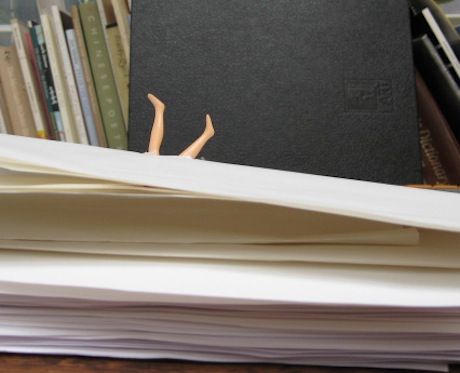Many thanks to everyone who answered, or wrote around, or entertained, Question #1 (In the 22nd century, what will the line look like, or do?) As promised, here are my imaginings around the question:
The line in the 22nd century will teeter and pierce and contain a fluidity and buoyancy and substance altogether unknowable but present maybe already in the air–– the line’s languid, fervent tentacles finding manifestation mainly by the virtual world and the real world having merged. There will be no more sense of two worlds, of going “online” or staying off. The whole troublesome feeling of being in public in one’s own living room will cease. Privacy may have a chance of coming back. The page will not die, far from it, the page will grow exponentially and become huge, porous, cellular, layered. Soft porous plant-like material, mattress sized. To experience the poem, the reader will fall back into the page and through its layers, eventually resting buoyantly at whatever place in the page gravity and one’s body weight sends one. The poem would be an even more bodily and sensorial experience, reaching the heart, ears, legs, toes, fingers, intellect, the whole corpus. The body would truly enter the poem, having entered the page. The lines of the poem would come in discrete units, like they do now, so that the reader still enjoys the duration of the time the poem takes. Where will the lines take me next, how will the poem find its full embodiment—the tumble of sounds-- these durational pleasures/investigations of reading will persist. Great innovations of the line and page (Dickinson, Whitman, John Cage, Mallarme, Doctor Williams, Apollonaire, insert whoever else may come to mind here) will all be haunting the new line like reliable old beans. But because the line has traveled through this merging of worlds–– the virtual and real––it will carry new dimensional properties, new sensations of substance and atmospheric conditions. Poetry will still be a kind of listening, feeling, thinking. As ever, lines will be buoyant with their favorite companion, the unspoken.
Wanted to respond to Sina Queyras’ thoughtful response. I am not worried about what the line in the 22nd century will look like, only excited about what it might be, and how other working poets may perceive of it. And no no no no no not interested in those who may want to control such a thing—and definitely not interested in any “orderly march forward.” I much prefer a divine mess. And as many divine messes as possible. Hence the question to the wide range of poets currently posting. I ask this question mainly as an invitation to speculate and play, to imagine. Am puzzled by this sentence: “It would seem that if you’re defining poetry as occurring in 40 lines or less you have something very precise in mind.” I think someone else’s post (just read through them all and now can’t find it) had some concerns about the 40 line poem, but twasn’t moi.
I too liked that Christian Bok’s post came right on top of mine, a kind of answer already . . .
Here's Question for Poetry #2: I have recently been re-reading Georg Trakl (and teaching Christian Hawkey’s wonderful Ventrakl to my graduate cross-genre workshop), paying special attention to the way Trakl uses color. Color is present in almost all Trakl poems, but a heavily fixed symbology or color system eludes the work. In Trakl, color seems to work just outside its (or our) expectations. Using a limited number of colors that appear sort of cycled through the work, Trakl's poems seem saturated, embued, illuminated with color, but not in ways one might predict Here’s a sample from "Transfiguration," translated by Daniel Simko:
By your feet
The graves of the dead open
When you lay your forehead into your silver hands.
The autumn moon
Lives silently on your mouth,
Drunk on poppy-juice, dark songs;
Blue flower
Quietly resounding in yellowed stone.
So here is question #2: What is your palette? What colors are most often present in your work? How does color act within in your poems?
The daughter of radio station owner-operators, poet, editor, and translator Gillian Conoley was born...
Read Full Biography


